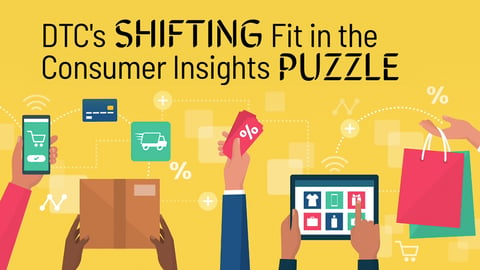DTC’s Evolving Role in Building Privacy-Led Consumer Experiences
With third-party data falling out of favor and consumer preferences changing all the time, CG brands are having to strategically rethink how to target audiences and create value. In the face of these large-scale changes, innovative industry leaders both large and small are embracing DTC initiatives as a way to drive engagement, level up their marketing efforts, implement product improvements, and ultimately meet consumer needs.
DTC provides a unique channel for CGs to personalize experiences and gather zero and first-party data without unnerving consumers or running afoul of ever-shifting privacy laws. In this Q&A, Khurram Moiz, lead principal, retail customer success at BlueConic, shares perspectives on how to leverage direct-to-consumer models into privacy-first customer experiences, and where brands should concentrate their efforts to unlock datasets that drive business forward and provide actionable insights. Moiz also touches on social commerce, retail media networks, and how to embed capability-building across the workforce to fuel growth and build confidence.
CGT: What are some of the most recent shifts in the market – and in consumer behaviors – that have made direct-to-consumer initiatives so essential?
Khurram Moiz: Consumer shopping behavior is evolving rapidly. Online shopping adoption was accelerated by the pandemic, but the pendulum has started to swing in the other direction. Rapid shifts in consumer behavior create opportunities to better understand and engage with consumers. For example, according to Pitney Bowes, 64% of consumers prefer delivery, but 23% prefer curbside pickup. Smart brands are using their DTC presence to understand and meet customers’ diverse and evolving buying preferences.
Personalization is essential for delivering quality experiences. According to research from McKinsey, 76% of customers get frustrated when companies don't offer personalized experiences. Consumer goods companies, who traditionally sell their products through intermediaries, often lack access to the individual-level behavioral and transactional data they need to better understand consumers. DTC initiatives help companies collect first-party data so they can deliver the personalized experiences customers expect.
Social shopping is gaining popularity. Customers are increasingly comfortable purchasing products in emerging channels. eMarketer predicts about 52% of social network users will make at least one purchase via social commerce by 2025. Consumer goods brands must actively learn from consumers across even more touchpoints leading up to a sale if they want to optimize their direct-to-consumer marketing mix.
CGT: What are some best practices and benchmarks companies should strive for when looking to build a customer-centric data strategy?
Moiz: Build a first-party data asset. Soon, third-party data sources and identity proxies many brands rely on to fuel advertising and marketing will be less effective, or even nonexistent. Even today, third-party data is problematic; when competitors have access to the same data providers, “your” data can never be a strategic advantage. Building a repository of unified, actionable first-party data enables brands to weather the third-party data storm and create unique experiences no competitor can replicate.
Keep consent and security at the center of your strategy. Brands don’t just have a duty to protect and use the data customers share with them in a responsible manner, their reputation depends on it. Respect for customer data and compliance are essential for building trust. If your customer data isn’t standardized, secure, and consented, it’s time to act.
Empower non-technical teams to liberate first-party data. Traditionally, the ability to access, analyze, and act on customer data has been restricted to a highly technical few. Companies with best-in-class data strategies are onboarding capabilities that enable their non-technical teams to drive real-time, personalized experiences based on first-party data. All without having to rely on IT or specialized agencies.
CGT: How can privacy-led digital experiences unlock more value for CGs?
Moiz: Privacy-led relationships make personalization feel thoughtful, not ‘creepy.’ Consumers have a complicated relationship with data sharing. We expect the brands we buy from to know us but can feel uneasy about sharing the information required to enable high-quality experiences. Brands that lead with a privacy-first approach are better positioned to personalize experiences that feel like getting to know someone, rather than invading their privacy.
Quality, consented data is key to optimizing your marketing mix. Consumer goods marketers aspire to optimize their marketing mix with just the right touchpoints. Collecting quality, consented data is key to getting this marketing flywheel turning. Without a privacy-led approach to collecting data, delivering high-quality customer experiences becomes next to impossible.
Privacy-aware consumers gravitate towards like-minded companies. According to McKinsey, 87% of people surveyed consider trustworthiness and data protection nearly as important as price and delivery time. Prioritizing consumer privacy not only offers a strategic advantage for a more privacy-aware consumer base but also mitigates the risk of running afoul of consumer data privacy laws.
CGT: Looking ahead, what are some of the greatest areas of opportunity for CG companies, and how can direct-to-consumer initiatives help them leverage these opportunities?
Moiz: Harness the power of your first-party data. A brand’s owned channels are treasure troves of data that can be used to better understand consumers. As brands start to discover opportunities hidden in the data they already own, they can reposition and optimize channels, products, and engagement to achieve their goals and fuel the consumer experience.
Onboard capabilities that empower non-technical teams. Limited access to highly technical teams is common in consumer goods companies. Industry leaders are embracing solutions, like customer data platforms, to empower non-technical business users with out-of-the-box artificial intelligence tools to run advanced analytics, make real-time product recommendations, and identify the next best touchpoint for consumers, without having to sit in a lengthy IT queue.
Catch the retail media network wave. Retail media networks enable advertisers to engage directly with retailers’ unique shopper audiences. Through second-party data sharing and robust measurement, consumer goods companies can leverage data from their DTC initiatives to have relevant conversations with the right consumers across channels. Brands that successfully extend their omnichannel programs to retail media networks will unlock valuable insights and more efficient media investments.








